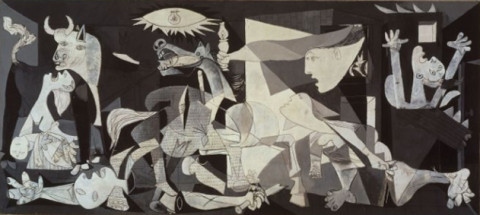Mahmood Darwish, Five Years Already
 Last night, just before falling asleep I was reading in Pascal Quignard’s Sur le jadis (volume 2 of his Dernier Royaume series) & came across the following sentence: “C’est une plaie qui cherche son couteau. / It is a wound looking for its knife.” I put the book down to go to sleep, but the sentence kept running through my mind & for some reason started to irritate. I turned the light back on, opened my notebook & wrote: “But if it is a wound, it has already known its knife & does not need it any longer. Except to heal? How could that be?” Then I went to sleep. This morning, waking up to a glorious sunrise, the French sentence returned, but twisted, in my mind as “C’est une plaie qui fuit son couteau / it is a wound that flees its knife” — though when writing it down in the notebook a bit later, I mistakenly translated my own French as “it is a sentence that flees its knife.” So now sentence replaces wound. A wound is a sentence & a sentence a wound. A sentence does go both ways. Wounds can heal, can scar over. Sentences are ab initio traces, i.e. scars on the air we speak them through or on the paper we trace them on.
Last night, just before falling asleep I was reading in Pascal Quignard’s Sur le jadis (volume 2 of his Dernier Royaume series) & came across the following sentence: “C’est une plaie qui cherche son couteau. / It is a wound looking for its knife.” I put the book down to go to sleep, but the sentence kept running through my mind & for some reason started to irritate. I turned the light back on, opened my notebook & wrote: “But if it is a wound, it has already known its knife & does not need it any longer. Except to heal? How could that be?” Then I went to sleep. This morning, waking up to a glorious sunrise, the French sentence returned, but twisted, in my mind as “C’est une plaie qui fuit son couteau / it is a wound that flees its knife” — though when writing it down in the notebook a bit later, I mistakenly translated my own French as “it is a sentence that flees its knife.” So now sentence replaces wound. A wound is a sentence & a sentence a wound. A sentence does go both ways. Wounds can heal, can scar over. Sentences are ab initio traces, i.e. scars on the air we speak them through or on the paper we trace them on.
It is then that the fact that today is the 5th anniversary of Mahmood Darwish’s death came to accompany, or better, to shadow this wound / sentence /knife thought chain. Not that it resolved anything. Not that it made anything clearer in my mind. These two events, Quignard’s sentence, & the anniversary of the Palestinian poet’s death are simply, i.e. complexly there, together, unconnected. Or not connected in a simple — healing? — way, such as claiming that the writing of his, Darwish’s, poems is a scaring over, thus some sort of a healing of the wounds the loss of his people’s land & lives represents.
An image now comes to mind: the tongue that speaks the sentences that scar the air & the paper is itself in the shape of a knife — it is the tongue-knife that emerges from the mouth of the horse in Picasso’s Guernica. (Notice that the terrorized human heads in the painting are all tongueless, though open-mouthed in silent screams of horror & agony.)
The poem this knife-tongue speaks is sentenced to stay an open wound that does not look back, that cannot return to its pre-wound status, & yet it will always remain a poem, that is a jubilation, a life-force.
* * *


 “Interglacial Narrows (Poems 1915-2021)” Contra Mundum Press
“Interglacial Narrows (Poems 1915-2021)” Contra Mundum Press “Always the Many, Never the One: Conversations In-between, with Florent Toniello” Contra Mundum Press
“Always the Many, Never the One: Conversations In-between, with Florent Toniello” Contra Mundum Press “Conversations in the Pyrenees”
“Conversations in the Pyrenees” “A Voice Full of Cities: The Collected Essays of Robert Kelly.” Edited by Pierre Joris & Peter Cockelbergh
“A Voice Full of Cities: The Collected Essays of Robert Kelly.” Edited by Pierre Joris & Peter Cockelbergh “An American Suite” (Poems) —Inpatient Press
“An American Suite” (Poems) —Inpatient Press “Arabia (not so) Deserta” : Essays on Maghrebi & Mashreqi Writing & Culture
“Arabia (not so) Deserta” : Essays on Maghrebi & Mashreqi Writing & Culture “Barzakh” (Poems 2000-2012)
“Barzakh” (Poems 2000-2012) “Fox-trails, -tales & -trots”
“Fox-trails, -tales & -trots” “The Agony of I.B.” — A play. Editions PHI & TNL 2016
“The Agony of I.B.” — A play. Editions PHI & TNL 2016 “The Book of U / Le livre des cormorans”
“The Book of U / Le livre des cormorans” “Memory Rose Into Threshold Speech: The Collected Earlier Poetry of Paul Celan”
“Memory Rose Into Threshold Speech: The Collected Earlier Poetry of Paul Celan” “Paul Celan, Microliths They Are, Little Stones”
“Paul Celan, Microliths They Are, Little Stones” “Paul Celan: Breathturn into Timestead-The Collected Later Poetry.” Translated & with commentary by Pierre Joris. Farrar, Straus & Giroux
“Paul Celan: Breathturn into Timestead-The Collected Later Poetry.” Translated & with commentary by Pierre Joris. Farrar, Straus & Giroux